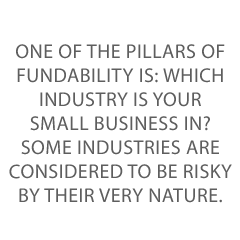This blog may contain affiliate links that might result in Credit Suite receiving a commission if you use them. This has no impact on the price you are charged for the product or service.
We talk a lot about a Fundable™ Foundation here at Credit Suite, but what, exactly, are we talking about?
Here, we’re going to lay out the specifics of what we mean when we say you should always start business credit building with a Fundable™ Foundation.
Creating a Fundable Company
The idea of Fundability in general is to make it more likely for a given business to get financing and/or credit. Give lenders and credit issuers more reasons to say, “yes”. And take away any reasons credit issuers and lenders might have to say, “no”.
Let’s look at the elements of a Fundability Foundation™.
What You Can Do On Your Own to Make Your Company More Fundable
Some aspects of a Fundable Foundation are utterly within your control. Others? Not so much.
We’ll start with the areas where businesses and their founders can exert the most control.
Industry
Whether they’re birthing startups or buying preexisting businesses, owners should pay close attention to the industry a company is in.
One of the pillars of Fundability is: which industry is your small business in? Some industries are considered to be risky by their very nature.
Often, this is because any of the following are in play:
- There’s a high risk of personal injury or property damage to employees or customers, such as in construction.
- Any small businesses in that field engage in a high number of cash transactions, which makes these a target for burglary. One example is convenience stores.
- It’s a field where there’s a lower bar to entry. As a result, lenders and credit providers are concerned that the field is littered with hobbyists who have not properly judged the market. Essentially, the thinking goes, if it’s easy to get into a field, then it’s just as easy to get out of it. An example is something like life coaching, versus a skill which requires education and experience, like graphic design.
And of course anything with more than one of these characteristics is going to be seen as risky—not just by business finance providers, but even investors if you decide to go that route.
Vice Industries/Industries Which Were Illegal in the Past
Another area of risk (although it may change over time) is so-called vice industries like strip clubs and the like.
As for formerly illegal industries, consider the cannabis field. Less than 25 years ago, it wasn’t even legal for medicinal purposes.
Now, it’s legal for recreational use in 18 states as of the writing of this blog post. And in even more conservative parts of the country (a total of 37 states), consumers have access to cannabis for at least medical purposes.
While dispensaries may still be considered to be risky by a lender or an investor, that may not be the case forever.
After all, before Prohibition ended, taverns and bars were illegal. And now, while investors and lenders may still feel they’re risky, they can still get funded.
Business Name
Fundable companies don’t always get business financing. But they also don’t set themselves up for immediate rejection. When a business contains the name of a risky field, lenders and credit providers are less likely to read any further.
To get around this, keep risk out of your company name. Your business can be Amy’s instead of Amy’s 24-Hour Store.
Yes, a lender or provider will figure it out soon enough. But here’s where you going in person (not online if that’s at all possible) to a business financing issuer can come into play. Without being rejected from the start, you can do your best to make a case to a provider. With good business and personal credit reports in hand, and a business plan that shows you understand your market well, a lender just might make an exception.
If they think your loan, etc. will be valuable to them, then they may take a chance on your business.
But you’ve got to get your foot in the door first. Keeping risk out of your business name is the more Fundable way to do that.
Address
Your business address has to be an actual brick and mortar building where you can receive mail. But it doesn’t have to be separate from your home if you don’t want that.
Many successful companies started in garages. But once you start entertaining prospects, meeting clients, and interviewing job candidates, your garage is probably not going to cut it anymore.
Before you decide to pay for a building or rent office space, consider a virtual address. A virtual address can also be a good idea if you need to hold a meeting or an interview, and it’s a lot more professional than doing this at your kitchen table.
We like Regus, Davinci, and Alliance Virtual Offices. But at least one credit issuer will not accept virtual addresses.
Phone Number
A business will need its own phone number. An 800 number is seen as more professional and can help you become more Fundable.
After all, if your prospects don’t have to pay to contact you, you have a much better chance of converting them to clients. The more clients and profit, the more Fundable any business will be.
VoIP
Voice Over Internet Protocol, or VoIP, is a means of having one phone ring on another line. Essentially, VoIP is the technology that converts your voice into a digital signal, allowing you to make a call directly from a computer, a VoIP phone, or other data-driven devices. As a result, you can use your cell phone, say, for both your regular personal calls and for business calls.
Your clients need never know that you don’t have a separate handset—that part shouldn’t matter to them. For them, so long as you’re answering the business’s phone number, then that’s your business number to them. They don’t need to know the details.
411 Listing
Make sure at least your main business phone number is on 411. Your phone number must have a 411 listing for most credit issuers and lenders to approve you.
Check your record to see if your information is accurate. No record? Then use a service like ListYourself.net to get a listing.
Website Address
Credit issuers and lenders will research most small businesses online. It will be a lot better for your company if their search for information was focused mainly on data you provide them, as opposed to what your competition thinks of you. Or, worse, if they can’t find information on your business at all.
You need a website address even if you think none of your customers are looking for you online.
It’s best to purchase your own domain from an internet hosting company. Your online reputation matters when funding providers are checking your business out online. Not owning your own domain tends to look considerably less professional. A huge link which includes the name of a free site will do you no favors.
Plus, even if website development isn’t one of your strong points, domain hosting providers often provide services to help you get rolling.
Also, owning your own domain gives you considerably more freedom in terms of look and feel. You can create a shopping experience for your clients to order from you via a link where you can even track where they surfed in from.
Retain Ownership of Your Content and Intellectual Property
And finally, owning your own domain is more Fundable because depending on sites like Facebook means you’re beholden to their site rules. They may not like your pictures or may try to use them for their own purposes.
Plus, these sites may not last forever.
After all, when’s the last time you looked for something on Myspace?
Most hosting companies provide get at least one free email address connected to a domain.
Make everyone’s life easier at your business and go with a generic email address for basic information, such as [email protected] or [email protected]. That way, when employees inevitably come and go, there’s already an expectation set. If employee A leaves, your customers will know employee B can still help them out.
And you can set up several employees to access the same address, as it won’t be used for anything private.
Visit Your Secretary of State’s Office and Comparable Offices for Your City and County For Licenses
Your Secretary of State’s office may have resources to help you determine what you need. They may also have tips on doing business in the state.
Always make sure if your business will need to be licensed. This is not just to keep you out of legal trouble. Consumers tend to afford more trust to a company which shows it has proper licensing.
Visit the IRS Website for These
The Internal Revenue Service has a well-designed, relatively easy to use website. You’ll choose the next three details there.
You will need to go to Apply for an EIN and then follow the prompts. Always choose to receive your EIN via PDF versus the mail, as you’ll get access to it a lot more quickly.
Business Entity and EIN
It is best to be incorporated. This is good for funding but also for legal liability. Even an early stage startup can be incorporated. Partnerships do not offer this sort of protection.
A corporation is a separate legal entity because a corporation is essentially treated as a person. Hence, it can build credit on its own.
A corporate entity is also helpful for tax and liability purposes. In partnerships, partners can end up with higher shares of cost and more liability.
There is more than one type of corporate entity. But you’re likely only looking at a C corporation or an S corporation. As for which entity is better for your Fundable business, we recommend that you check with a legal or accounting professional first.
To do business, you will need to have an EIN. In part, this is for tax payments. The process for selecting an EIN is spelled out on the IRS website.
NAICS Code
The Census Bureau keeps track of NAICS codes, which determine which field a startup or other business is in. When you set up your business with the IRS and specify what type of business you’re in, you’ll get an NAICS code.
Codes can show more or less risk, although even the NAICS itself doesn’t have a terribly complete or up to date list of which codes carry more risk than others.
Business Credit Reporting Agencies have their own ideas on NAICS codes and risk—and often the public cannot get access to such lists.
Consider risks in the above industries section. If your business can fit under more than one NAICS code—or if you can change your offerings to a less risky field with little expense—then go for what’s less risky. But if you can’t, then you may need to attempt to make your case for getting funded in person.
Taking Care of Finances with a Business Bank Account
Any Fundable company needs a good way to manage its funds.
You will need an EIN to set up a business bank account. You must have a bank account devoted strictly to your business. The IRS does not want you commingling one fund with another. Make accounting easier and reduce the risk of audit at tax time. Keep personal and business funds separate.
Your business banking history is vital to future success in getting larger business loans. Since you may need to provide business bank statements, starting your business bank account early can help.
The longer your business banking history, the better your borrowing potential. Lenders may also have requirements concerning number of monthly deposits.
Opening a business bank account with a bank which understands your type of business can be helpful later. Your positive banking history with them will give you an edge for getting loans.
Banks also look favorably if you use a variety of their products and services. They want to see more money come in than go out, and they want to see consistent deposits.
Merchant Account
A merchant account technically isn’t a Fundability factor. But it’s still a good idea, because it enables you to take credit cards. Study after study shows consumers will pay more if they can use plastic.
Get Set Up With the Business Credit Reporting Agencies
For business credit building, the process won’t happen automatically. You will have to actively participate in the development of credit for your business.
D&B, Experian, and Equifax
Your first stop is getting a DUNS number from Dun & Bradstreet. You won’t have a business credit score without it. A D-U-N-S number, plus three or more reported payment experiences, generates a PAYDEX score for your company.
Once you’re set up with D&B, Equifax and Experian will also start to generate scores for your business. Good business credit scores will always make a company more Fundable.
Time in Business
You will have no control over this one. For this factor, only the passage of time will strengthen your Fundable Foundation.
The Importance of Consistent Business Information
To be more Fundable, your business information needs to be consistent everywhere. But why?
The answer is: a lender or credit issuer won’t stop to think about all the different ways information can be listed, such as an ampersand (&) versus the word and. Rather, they’ll see inconsistencies as fraud and deny the application.
You have control over this, but it can be a lot of details to keep track of. The best advice I can give you is to keep track as well as you can of where your business information is online and offline, and update it all if anything changes, like your business name or address, etc.
Takeaways
Beyond time in business, much of a Fundability Foundation is well within your control. Act as early as you can to become more Fundable, and your business entity will reap the rewards for years to come. Contact us today to learn how we can help you improve your business Fundability.

